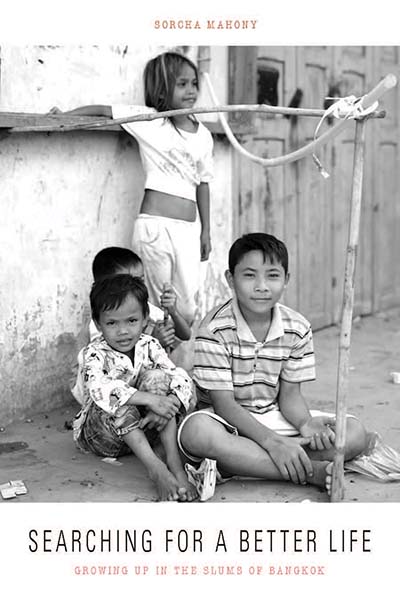“Strongly argued and documented, Searching for a better life avoids being either mawkish or jargon-laden. It offers genuine insight into the dilemmas of those unfortunate enough to be born into conditions of marginality in a society consumed by, and consuming, conformity in the aspiration to unattainable self-perfection.” • JRAI (Journal of the Royal Anthropological Institute)
“Mahony’s work is a fascinating and entertaining read. Her style of writing is scenic, and she seems to take the reader with her to the Khlong Toey slum by telling very detail orientated stories. Although she keeps the engagement with theoretical approaches and the current state of research at the minimum, this book is worth considering, especially for students. The author offers a deep insight into her research process, along with all the struggles and changes she took, making herself as well as her book extremely approachable.” • Anthropological Notebooks
“…an engaging but highly readable ethnography of youth in Thailand’s capital… As searching for a better life is currently a dominant concept on the global level, this book is a welcome contribution to scholarly and public debates on inequality and struggles for change.” • Public Anthropologist
“The quality of the writing is superb and it reads like a novel in places… it is highly engaging and will appeal enormously to students.” • Heather Montgomery, The Open University
“I found this an interesting and enjoyable read. The author writes extremely well, her subject is engaging and the argument she makes important. The young people come vividly to life in a way that is quite rare, even in very good ethnography, and we get a real sense of at least some key aspects of their lives.” • Sarah C. White, University of Bath
Life in Bangkok for young people is marked by profound, interlocking changes and transitions. This book offers an ethnographic account of growing up in the city’s slums, struggling to get by in a rapidly developing and globalizing economy and trying to fulfil one’s dreams. At the same time, it reflects on the issue of agency, exploring its negative potential when exercised by young people living under severe structural constraint. It offers an antidote to neoliberal ideas around personal responsibility, and the assumed potential for individuals to break through structures of constraint in any sustained way.
Sorcha Mahony works as Senior Researcher at The Children’s Society, a charity that supports vulnerable children and young people in their search for a better life in England and Wales. She lives in London with her two children and volunteers with young refugees in her spare time.
LC: HQ799.T52 B35 2018
BL: DRT ELD.DS.313907
BISAC: SOC002000 SOCIAL SCIENCE/Anthropology/General; SOC026030 SOCIAL SCIENCE/Sociology/Urban; SOC047000 SOCIAL SCIENCE/Children's Studies
BIC: JH Sociology & anthropology; JFSG Urban communities


